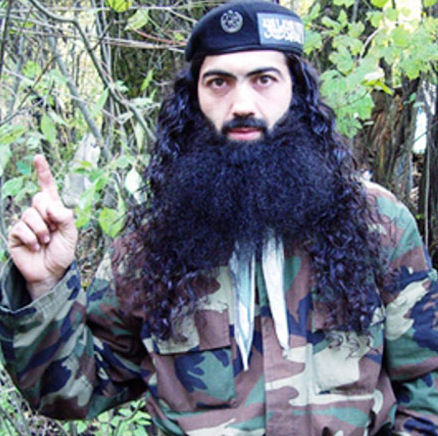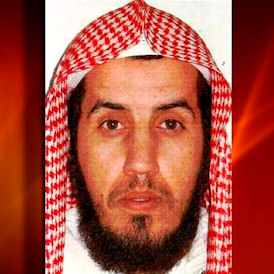‘Chechnya’s bin Laden’ killed by Russian troops
Russian security forces have killed al-Qaeda’s envoy to Chechnya four days after Osama bin Laden was shot dead in Pakistan. Channel 4 News understands he had visited Pakistan in the past few months.

Doger Sevdet, who had taken on the nom-de-guerre Abdullah Kurd, was the so-called ‘bin Laden of the North Caucasus’; a Turkish national who “coordinated foreign rebels,” according to Russia’s national anti-terror committee.
His death on Tuesday came a matter of hours before two mid-level al-Qaeda operatives were killed in a suspected drone attack in Yemen and a Saudi Arabian member of the terrorist organistaion gave himself up.
Kurd was killed along with several other terrorists when security forces stormed the Chechen village of Vedeno in the Vedesnk region.
Officials said the operation was only made possible by “active cooperation with foreign partners”.
At the time of writing it remains unclear whether information recovered from the Abbottabad compound in northern Pakistan where bin Laden was shot and killed by US Navy SEALs on Monday was used to help locate Kurd’s whereabouts.
However, Russia’s national anti-terror committee said that 35-year-old Kurd’s Turkish passport contained visas for Pakistan, as well as Georgia and Azerbaijan.
And a source in Moscow has told Channel 4 News that Kurd was in Pakistan, “definitely the last few months, possibly in the past few weeks. Counter terrorist officials are trying to see if there is any recent direct link with bin Laden.”
Referring to the information found in bin Laden’s compound, the chairman of America’s Intelligence Committee, Mike Rogers, said this week: “we have to go through… small pieces of information can be critically important.”
Reign of terror
Abdullah Kurd, who arrived in the North Caucasus in 1991, had taken part in the planning of numerous acts of terror and attacks on members of the public and security forces.
His death comes two weeks after Russia killed another top al-Qaeda militant in Chechnya, a Saudi operative known as Moganned in what analysts said was one of its biggest security successes in the region for years.
The past year has seen Moscow rocked by a bombing at the country’s busiest airport that killed 37 in January and a twin suicide attack that claimed 40 lives during morning rush hour on the metro in March 2010.
Yemen ‘drone attack’ kills two
Meanwhile, two mid-level al-Qaeda operatives have been killed in what appears to be a US drone strike in Yemen.
Channel 4 News Special Reports: Drone warfare
The Yemeni defence ministry named the men as two brothers, Musa’id and Abdullah Mubarak, and said they were killed at around dawn in the remote province of Shabwa, where a Yemen-based wing of al-Qaeda in the Arabian Peninsula (AQAP) is active.
Eye witnesses said they had seen a drone in the area at the time of the strike.
President Ali Abdullah Saleh’s government, which has increasingly been co-operating with US counter-terrorism operations, saw its military aid from the US double to $150 million (£90m) last year.
Last year, WikiLeaks cables revealed that President Saleh covered up US drone strikes against al-Qaeda in the country and claimed the bombs were Yemeni.
The document from a January 2010 recorded Saleh telling Gen David Petraeus, then commander of US forces in the Middle East, that: “We’ll continue saying the bombs are ours, not yours.”
Some of al-Qaeda’s most wanted terrorists are belived to be inside Yemen. They include AQAP’s leader Nasir al-Wuhayshi, a former Guantanamo Bay inmate who for years acted as secretary to bin Laden in Afghanistan and Anwar al-Awlaki and Ibrahim Hassan al-Asiri, who are believed to the masterminds of the failed ink cartridge bomb plot of 2010.
Also believed to be active in Yemen are Fahd Mohammed Ahmed al-Quso and Jamel Ahmed Mohammed Ali al-Badawi who were convicted of helping plan the 2000 USS Cole bombing. Both are on the FBI Most Wanted Terrorists list with $5m bounties on their heads.
AQAP has targeted American soil twice in the last two years. Both the ink cartridge bomb plot of 2010 and the 2009 Christmas Day bomb plot originated in Yemen.
Read more: AQAP: who are they?

Elsewhere, an al-Qaeda terrorist on Saudi Arabia’s most-wanted list has informed the authorities that he wants to turn himself in, according to the Ministry of Interior.
Khalid Hadhal Abdullah Al-Atifi Al-Qahtani phoned from outside the country to ask Saudi authorities if he could return to Saudi, said Maj Gen Mansour Al-Turki, security spokesman for the Ministry of Interior.